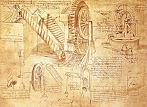Leonardo Da Vinci - Focus
Born out of wedlock, in a small Tuscan city called Vinci, on
April 15th, 1452, little was expected of young Leonardo. Being a bastard, Leonardo could not inherit his father’s
lands or last name, hence, he was known as Leonardo Da Vinci - Leonardo from Vinci.
Behind the success of the Renaissance was the use of
patronage and apprenticeships. Noble and wealthy individuals would pay, to
support and promote skilled artists and intellectuals. Da Vinci became the
apprentice of Andrea Del Verrocchio.
A true polymath, Da Vinci was: a painter, engineer, inventor, scientist and architect.
Disbelief was a common reaction towards Da Vinci’s abilities; so it would come as no surprise that people grew green with envy. Gossip spread like wildfire and Da Vinci was arrested under suspicion of Sodomy. Although cleared of the charges, this heavily damaged his reputation.
Within his journals, of which 15,000 pages still survive – Da Vinci outlined plans for Tanks, helicopters, robots, solar power and underwater breathing apparatus (that actually worked): this is the 15th century, a time when watches hadn’t yet been invented… let that sink in.
His mind being like a carrousel of continuous ambitious ideas, meant that he often left work unfinished, constantly directing his focus towards another project. Da Vinci possessed an insatiable curiosity that bordered on unethical, such as cutting up dead bodies to study human anatomy, something he kept very quiet in 15th-century Italy.
What maintained throughout all of Da Vinci’s wild endeavours
was that he wished to be a player in military matters. Having grown up hearing
about the songs and stories of valiant knights, Da Vinci might have felt as if
he had to do his part.
With Rome now under the control of ‘The Antichrist’, otherwise
known as - Cesare Borgia, Da Vinci finally got to implement his ideas and inventions
on the field of battle. However, the bloodthirsty Borgia had only blood on his mind;
Da Vinci witnessed what his crafts were capable of.
“Truly man is more
savage than beast. For our brutality exceeds theirs, we live by the death of
others” - Leonardo Da Vinci
After painting the Mona Lisa and experimenting with making
men fly. The King of France, Francis I, invited Da Vinci to live in his royal
castle. Da Vinci died in 1519, with his legacy standing as one giant question... How the fuck did he do all this?
Without a doubt, Da Vinci possessed incredible innate qualities, but he was a man just like anyone else. His key to success is found in his motto- relentless rigour, or as we might call it - focus.
Da Vinci found hours that people didn’t know existed. His wild curiosity was tamed only by a lazor-like focus on the tasks at
hand. He was not concerned with anything that did not aid his missions. His ferocious focus even made him skeptical about how necessary it was to sleep; choosing to sleep for 20 minutes every four hours.
The 21st century is the age of attention: TikTok, Instagram, Youtube and 24-hour news. We give away our most valuable asset for what? A celebrity scandal that has nothing to do with us? The biggest hurdle, in getting focused, lasts 20 minutes. Overcoming that drive to watch that cat video, to eat something sweet, to do literally anything but sit down and work. Overcoming that, getting into a flow state, getting FOCUSED, leaves you with only one question - How far can I go?









Comments
Post a Comment